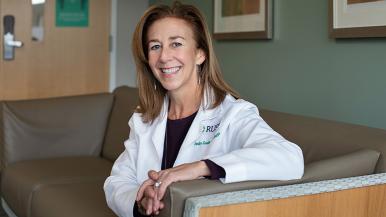When I meet with most patients, we discuss their active medical problems and tobacco history. For patients who are smokers, having the conversation that they fall into a category where they may be eligible for a lung cancer screening is a wake-up call. I’ve had patients who were on the fence about quitting and began to make a more conscious effort to do so after I speak with them.
Patients who are over the age of 50, current smokers, or former smokers who quit within the last 15 years, or smokers who have smoked at least one pack a day for the last 20 years, are all eligible for a low-dose CT scan of the chest to screen for lung cancer.
Requesting a lung screening for these patients is very simple. When I open the patient’s medical record, a message prompts me to ask the patient whether or not they would like to receive the CT scan. This makes ordering really easy with just a few clicks. My patients have been very amenable, and I haven’t had any issues requesting a scan.
Catching cancer early
After the patient gets the screening, I receive a notification with their results. If the CT scan shows any suspicious nodules, my patient is then contacted by the lung cancer screening nurses and connected with a thoracic surgeon or interventional pulmonologist for a biopsy. Biopsies and other procedures can be scheduled within a week of the lung screen result.
Since the launch of the Rush Lung Cancer Screening Program in 2015, I have ordered over 100 screenings for qualified patients. The program has given me the tools needed to facilitate a conversation around smoking cessation and early detection.
For my patients who are current smokers, it raises their awareness that they are at higher risk for cancer and reminds them why they need to quit. The program also helps us catch lung cancer at an early stage when it’s easier to treat, and even curable in some cases.
Notably, I’ve had three patients diagnosed through this screening mechanism. All were women over the age of 60. They all had early-stage lung cancer and only needed surgery. I am happy to report these patients are in remission and are doing fine.




